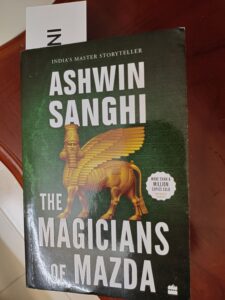Author, Poet, Raconteur
Mr. Sunil Kumar- President, Aglaia Interactive
Author, Poet, Raconteur
Sunil Kumar is the President of Aglaia Interactive.
Your Company Address
Tata Symphony, Chandivali, Mumbai
By Sunil Kumar
“Silence is worse, all truths that are kept silent become poisonous”
– Friedrich Nietzche , Thus Spake Zarathustra
O Bhagavan, Oh Khodai! Reading ‘The Magicians of Mazda’ by Ashwin Sanghi is a rip-roaring deep dive into history and many truths that have been long buried by the sands of time. The ‘Bawa'(Parsi) culture of Mumbai and the mention of scones and mawa cake is a delightful accoutrement.
After reading a few of his books, I have realized that nobody can quite spin a yarn that incorporates historical vistas and espionage quite like the author. Growing up in Mumbai, I could get the very city-related vibe that this book emanates. The Parsis(Indian Zoroastrians) are quite an integral part of the city, and nobody can truly claim to be a Mumbaikar without encountering at least one quirky, eccentric representative of this distinctive faith.
Ashwin takes us through a thrilling ride from London to the United States, Iran, Afghanistan and India(particularly Kashmir). Dollops of historical information are served to the reader via the characters of Cecile and Linda. His earlier books have shared a similar template, but personally the more recent ones including ‘Keepers of the Kalachakra’ have been a more enjoyable read.
Hollywood ‘pop’ culture in line with its Euro-centric narrative has nevertheless given us interesting takes on Persia with the corny 2006 Zack Snyder film ‘300’ and its over-the-top ‘Xerxes’. Also, Oliver Stone’s movie on ‘Alexander’ offered us a very comical take on the ancient Achaemenid empire with its turbaned Persians. Sanghi also touches on the infamous razing of Persepolis giving the benefit of doubt to the Macedonian vandal Alexander. Historical exposition tends to get a bit over-detailed at times but Ashwin manages to skillfully weave it to propel the story forward.
The Parthians, Sassanids and the complete decimation of the Zoroastrian faith in its main homeland, Iran after the advent of Islam and the subsequent Caliphates upto the temporary resurgence in Raza Shah Pahlavi’s Iran and the regression back to a genocidal normal post the Khomeini led “Revolution” has been mentioned. The tragic story of the Yazidis who also like the Gypsies seem to have a connect with India’s hoary past find their way in.
American billionaires, Chinese commercial real-politik as well as India’ R&AW and the Pakistani ISI make a guest appearance. The brutal persecution of the Zoroastrians by the Islamic caliphates, relegation to ‘Dhimmi’ status and their partial exodus to India is all heart-rending. Magi in the ancient Parsi belief system, their practical mysticism, connection to Christ’s resurrection and the powers of the ‘Hamza Dura’ are mentioned very often.
Sanghi’s respect for the ‘Dharmic’ narrative is clear with the references to the Bhrigu-Brihaspati split, Battle of the Ten Kings, Yajna-Yasna cognate words as well the Atharva Veda- Athravan Star and references to the Mittani and some of the core beliefs from Kashmiri Shaivism(Spandan et al).
Although all of this is something I’ve read from different sources offline and online, the author has managed to use it in a realistic, non-hyperbolic fashion. Surprised by the fact that despite his erudition, he tends to refer to Puranic beliefs as ‘mythology’ a West-loaned word that he must be well aware has it roots in the Sanskrit ‘mithya'(untruth).
Having met the author a few times and watched him in action interviewing a former Mossad agent-turned-author at a literary fest, I expected his book to be full of sensational spycraft, and he lives up to that expectation. The Bombay Parsi Panchayat, bungalows in Khandala/Lonavala, the Indian Zoroastrian connection to big business and Western classical music are incessant tropes to anybody who reads Mumbai’s tabloids.
The remarkable success Parsis achieved in India despite being such a small minority are a testament to their adaptability, hard work and the intrinsically inclusive, tolerant nature of India’s majority community. However, their relative insularity and strictures against inter-community marriage are a few negative points which the author very vaguely touches on.
Lessons in an Indic perspective from the author’s ‘Bharat’ series and this book in particular are to be prepared for war although striving for peace.
Given the indifferent nature of Indians towards their own history and self-negating myths perpetuated in our historiography, it is good that Ashwin Sanghi manages to churn out such books that subtly encourage the inquisitive reader to dig deeper. Summing up, I believe the aforementioned are plus points in the “Magicians of Mazda’. The only negatives are the narrative tends to lag at times, and even for a history buff like me becomes a little boring with the over-extended conversations with the aunt Cecile and the wife Linda. Certainly worth a read.